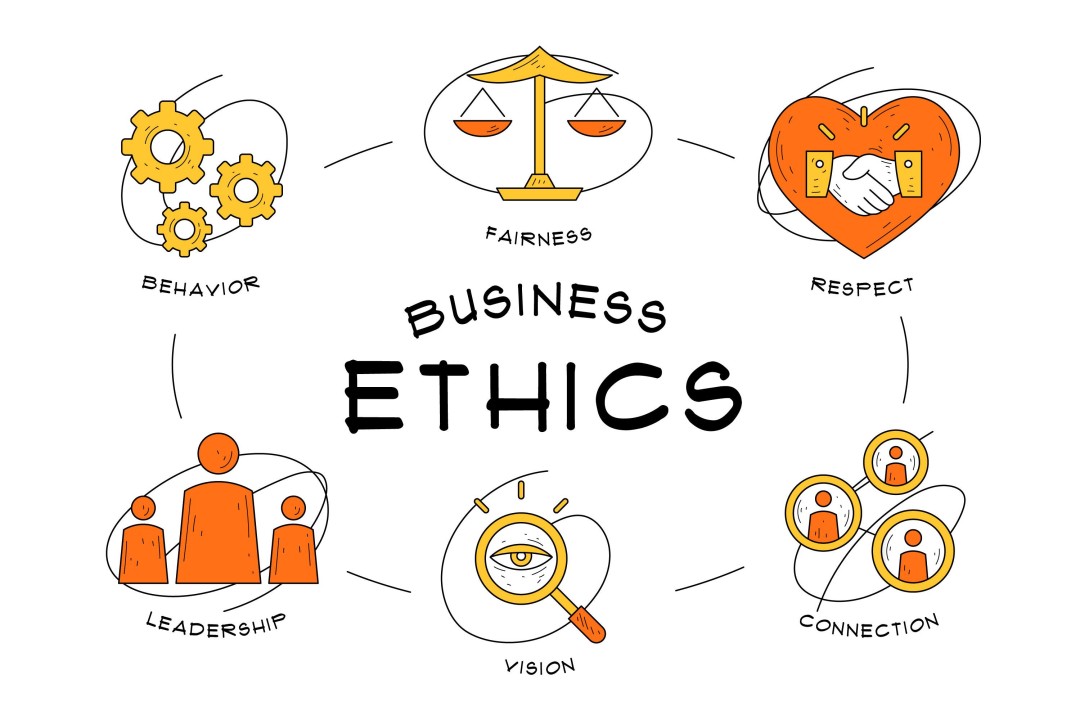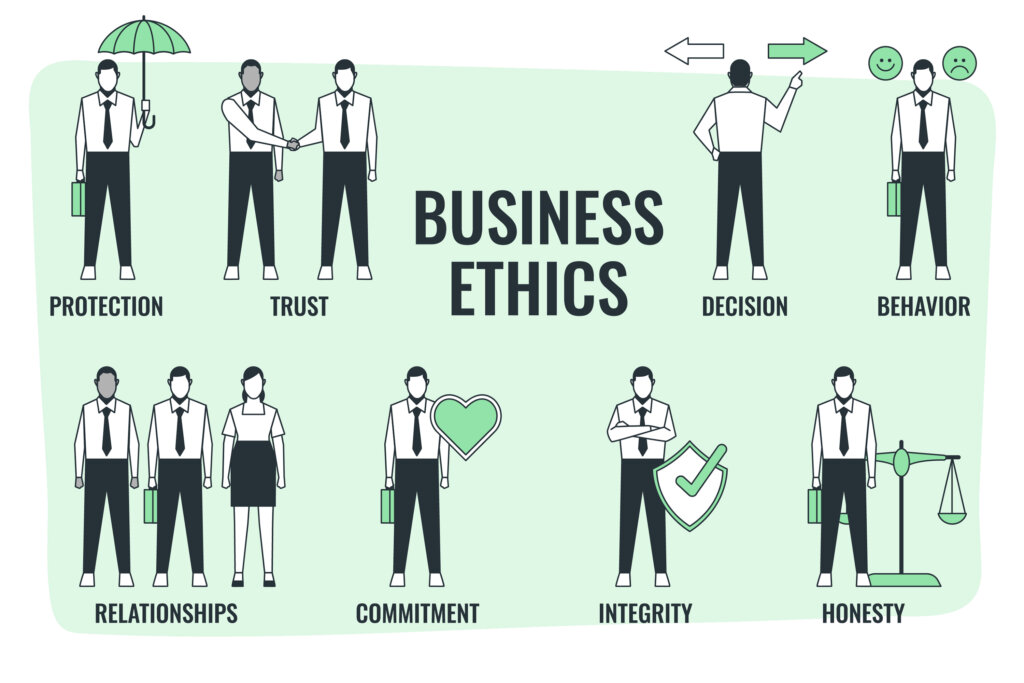Strategies For Strong Ethics In the ever-evolving landscape of modern business, the concept of Strategies For Strong Ethics holds a prominent position. It’s not just about adhering to a set of rules or guidelines; it’s about fostering a culture of integrity, responsibility, and social consciousness. This exploration delves into the strategies that revolve around Strategies For Strong Ethics, crafting effective Strategies for Ethics, and how these components are integrated into an organization’s Strategies For Strong Ethics.
Ethical Strategy: The Foundation of Ethical Business
Ethical Strategy is the cornerstone of any business aiming to make ethical practices an integral part of its DNA. It involves a comprehensive and forward-thinking approach that encompasses various facets:
Ethical Leadership
Leaders play a pivotal role in setting the ethical tone within an organization. Their commitment to ethical behavior sets the standard for employees and shapes the company’s culture.
Code of Ethics
An essential component of Ethical Strategy is the development and implementation of a robust code of ethics. This document outlines the company’s core values, principles, and ethical expectations.
Stakeholder Engagement
A key element of Ethical Strategy involves engaging with stakeholders—customers, employees, suppliers, and the community. It’s essential to listen to their concerns, understand their expectations, and address their needs.
Sustainability
Sustainability is a fundamental aspect of Ethical Strategy. It involves integrating environmental and social considerations into business operations, ensuring that the company operates in a way that respects the planet and its people.
Building Ethical Practices: The Art of Ethical Culture
Building ethical practices is not a one-time effort; it’s a continuous journey. It’s about creating a culture within the organization where ethics are ingrained in every decision and action.
Ethical Decision-Making
A critical component of Building Ethical Practices is equipping employees with the skills to make ethical decisions. Training programs, workshops, and real-life ethical scenarios can help in this regard.
Ethical Training
Building Ethical Practices involves providing comprehensive training on ethical issues, decision-making processes, and ethical behavior. This training should be ongoing and reach all levels of the organization.
Reporting Mechanisms
Establishing clear reporting mechanisms for ethical violations is an important aspect of Building Ethical Practices. Employees should feel safe reporting any unethical behavior, and there should be processes in place to address such reports.
Encouraging Ethical Behavior
Incorporating incentives and recognition for ethical behavior is an effective way of Building Ethical Practices. Recognizing and rewarding ethical behavior sends a clear message about the company’s values.
Strategies for Ethics: A Roadmap to Ethical Success
Crafting Strategies for Ethics involves the systematic planning and execution of actions that foster ethical behavior and compliance with ethical standards. These strategies include:
Ethical Risk Assessment
Strategies for Ethics commence with an ethical risk assessment, which identifies potential ethical pitfalls and challenges. This allows the organization to proactively address and mitigate ethical risks.
Ethical Auditing
Regular ethical audits are part of Strategies for Ethics. These audits help in assessing the organization’s adherence to ethical standards and identifying areas that require improvement.
Whistleblower Protection
Strategies for Ethics often include strong whistleblower protection mechanisms. Protecting employees who report unethical behavior is crucial to maintaining an ethical workplace.
External Certifications
Seeking external certifications or ethical standards recognition is a strategy embraced by many organizations. These certifications serve as a validation of the company’s commitment to ethical practices.
Ethical Business Plans: Charting the Ethical Course
Crafting an Ethical Business Plan involves weaving together all the components of ethical strategy, ethical practices, and strategies for ethics into a comprehensive roadmap for the organization’s ethical journey.
Ethical Goals and Objectives
An Ethical Business Plan must outline clear ethical goals and objectives that the organization seeks to achieve. These goals could pertain to environmental sustainability, fair labor practices, or community engagement.
Implementation Roadmap
A well-crafted Ethical Business Plan includes a detailed implementation roadmap. It outlines the steps the organization will take to achieve its ethical goals and specifies responsibilities and timelines.
Monitoring and Evaluation
Ethical Business Plans incorporate a system for monitoring and evaluating progress towards ethical objectives. Regular assessments help the organization stay on track and make necessary adjustments.
Communication and Transparency
Transparency is a key component of Ethical Business Plans. They should articulate how the organization will communicate its ethical efforts to stakeholders, fostering trust and credibility.
Real-World Applications of Ethical Strategy
To gain a deeper understanding of how Ethical Strategy is applied in the business world, let’s explore real-world examples:
Case Study 1: Ethical Leadership
A multinational corporation embraced Ethical Strategy by appointing an ethical leader at the helm. This CEO set an example by making ethical decisions a core part of the company’s culture. The commitment to ethical leadership permeated through all levels of the organization.
Case Study 2: Code of Ethics
A tech startup adopted a comprehensive Ethical Strategy by developing and implementing a robust code of ethics. This code served as a guiding light for employees, ensuring that their actions aligned with the company’s ethical values.
Case Study 3: Stakeholder Engagement
A consumer goods company implemented Ethical Strategy through extensive stakeholder engagement. This included listening to customer concerns about environmental sustainability and making changes to product packaging and sourcing based on that feedback.
Case Study 4: Sustainability
An international hotel chain embraced Ethical Strategy by committing to environmental sustainability. This involved energy-efficient practices, waste reduction, and community engagement. The organization’s strong commitment to sustainability aligned with its ethical goals.
The Future of Ethical Strategy
The future of Ethical Strategy is marked by several noteworthy trends and developments that will shape the ethical landscape:
Artificial Intelligence and Ethics
As artificial intelligence (AI) becomes increasingly prevalent, the intersection of AI and ethics will be a significant trend. It will raise questions about AI’s ethical use, decision-making, and accountability.
Ethical Supply Chains
The focus on ethical supply chains will intensify. Organizations will put more effort into ensuring that their products are sourced and produced ethically, respecting fair labor practices and environmental standards.
Global Ethical Standards
The push for global ethical standards will continue to gain momentum. As businesses operate in a global context, the need for consistent ethical principles across borders becomes increasingly evident.
Ethical Innovation
Ethical innovation will be at the forefront. Organizations will harness innovation and technology to address ethical challenges, creating solutions that align with their values.
Denouement: Strategies For Strong Ethics
In the intricate landscape of modern business, crafting a robust framework of Strategies For Strong Ethics is not just a moral imperative but also a strategic advantage. Organizations that embrace ethical leadership, clear codes of ethics, and stakeholder engagement create a culture of integrity and trust. They build a sustainable future where ethical practices are not just a checkbox but an essential part of the business’s DNA. Ethical Strategy is the compass that guides businesses toward a future where ethical success and financial success are intertwined.











+ There are no comments
Add yours